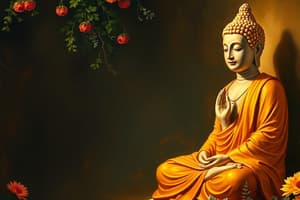Podcast
Questions and Answers
Was ist der Zweck von Ritualen vor dem Tod im Buddhismus?
Was ist der Zweck von Ritualen vor dem Tod im Buddhismus?
- Die Trauernden zu trösten
- Dem Verstorbenen ein gutes Karma zu verleihen
- Dem Verstorbenen ein gutes Leben nach dem Tod zu garantieren
- Dem Sterbenden zu helfen, einen friedvollen und achtsamen Tod zu erleben (correct)
Wer ist Siddhartha Gautama?
Wer ist Siddhartha Gautama?
- Einindischer Philosoph
- Ein Führer der Buddhistischen Gemeinschaft
- Der Gründer des Buddhismus
- Ein indischer Prinz, der zum Buddha wurde (correct)
Wo entstand der Buddhismus?
Wo entstand der Buddhismus?
- In Japan
- In China
- In Indien vor etwa 2500 Jahren (correct)
- In Tibet
Was ist das Ziel des Buddhismus?
Was ist das Ziel des Buddhismus?
Was geschieht nach dem Tod im Buddhismus?
Was geschieht nach dem Tod im Buddhismus?
Was ist der Zweck von Ritualen nach dem Tod im Buddhismus?
Was ist der Zweck von Ritualen nach dem Tod im Buddhismus?
Wie lang dauert der Zustand des Bardo an?
Wie lang dauert der Zustand des Bardo an?
Wodurch wird die Qualität der nächsten Wiedergeburt beeinflusst?
Wodurch wird die Qualität der nächsten Wiedergeburt beeinflusst?
Was ist das Hauptziel während des Sterbens im Buddhismus?
Was ist das Hauptziel während des Sterbens im Buddhismus?
Was geschieht während des Bardo-Zustands?
Was geschieht während des Bardo-Zustands?
Wofür dient die Praxis von Phowa?
Wofür dient die Praxis von Phowa?
Was beeinflusst die Qualität der nächsten Wiedergeburt?
Was beeinflusst die Qualität der nächsten Wiedergeburt?
Flashcards are hidden until you start studying
Study Notes
Introduction to Buddhism
- Buddhism is a religion and philosophy that originated in ancient India around 2,500 years ago
- It is based on the teachings of Siddhartha Gautama, known as the Buddha
- Buddhism emphasizes the attainment of enlightenment (Nirvana) through the Eightfold Path and the Four Noble Truths
Who is Buddha?
- Siddhartha Gautama was born around 563 BCE in Lumbini, India
- He was a prince who renounced his royal life to seek enlightenment
- After years of meditation and contemplation, he achieved enlightenment under the Bodhi Tree
- He taught his teachings to others, establishing the Buddhist community
Rituale vor dem Tod (Rituals before Death)
- In Buddhism, the moment of death is considered a crucial moment for the deceased's future rebirth
- Monks and spiritual practitioners often visit the dying to guide them through the process
- The dying person is encouraged to focus on their breath, let go of attachments, and cultivate a positive mind
- The goal is to achieve a peaceful and mindful death, which can positively influence the next rebirth
Rituale nach dem Tod (Rituals after Death)
- Funeral rites and rituals vary across Buddhist traditions, but often include:
- Cremation or burial
- Recitation of prayers and mantras
- Offerings to the deceased
- Merit dedication to benefit the deceased in their next rebirth
- The rituals aim to support the deceased's transition to the next life and provide comfort to the grieving family
Vorstellung von Tod und Leben danach (Concept of Death and the Afterlife)
- In Buddhism, death is seen as a transition, not an end
- The deceased's consciousness (or mindstream) continues to exist after death
- The next rebirth is determined by the individual's karma (actions and intentions) in the previous life
- The goal is to break the cycle of rebirth (Samsara) and achieve Nirvana, the state of liberation from suffering
Where did Buddhism originate?
- Buddhism originated in ancient India, specifically in the eastern part of the Indian subcontinent (present-day Bihar, Uttar Pradesh, and Nepal)
- It spread to Sri Lanka, Southeast Asia, Tibet, and East Asia, adapting to local cultures and developing various traditions
How does one become a Buddha?
- A Buddha is someone who has attained complete enlightenment (Nirvana) through their own efforts
- To become a Buddha, one must:
- Follow the Noble Eightfold Path
- Develop wisdom, concentration, and ethics
- Overcome ignorance, attachment, and aversion
- Realize the ultimate truth (Dharma) and achieve liberation from suffering
Studying That Suits You
Use AI to generate personalized quizzes and flashcards to suit your learning preferences.




